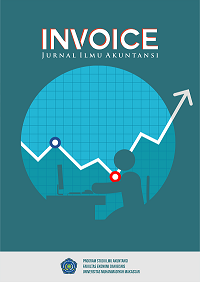The Effect of Material Flow Cost Accounting on Environmental Performance with Green Accounting as a Moderator
DOI: https://doi.org/10.26618/inv.v5i2.12313
Abstract
The aim of this research is to determine the effect of Material Flow Cost Accounting on Environmental Performance with Green Accounting as a moderating variable. This research uses a quantitative type of research using a purposive sampling method as data analysis. This research uses secondary data in the form of documentation obtained on websites, namely the company's annual report ( Annual Report ), financial report ( Financial Report) and sustainability report ( Sustainability Report ) obtained from the Indonesian Stock Exchange website and the websites of the companies that is the research sample. The number of mining companies included in the research sample criteria is 12 companies listed on the Indonesia Stock Exchange with the observation year 2015-2020. The results of this research show that Material Flow Cost Accounting does not have a significant positive effect on Environmental Performance. Meanwhile, Green Accounting as a moderating variable cannot strengthen the relationship between Material Flow Cost Accounting and Environmental Performance. The capability of the regression model is that only 11.7% of the variation in the value of the Environmental Performance variable can be explained by variations in the independent variables, while the remaining 88.3% is influenced by other variables not examined by this research.References
Abdullah, MW & Amiruddin, H. (2017). The Effect of Green Accounting on Material Flow Cost Accounting in Improving Company Sustainability. Journal of Economics and Finance. 1-186.
Almilia, Luciana Spica and Dwi Wijayanto. (2007). The Influence of Environmental Performance and Environmental Disclosure on Economic Performance. The 1st Accounting Conference, Faculty of Economics, University of Indonesia.
Aniela, Yoshi. (2012). The Role of Environmental Accounting in Improving Environmental Performance and Company Financial Performance. Accounting Student Scientific Periodical. 1 (1)
Cahyandito, MF (2009). Sustainable Development, Economics and Ecology, Sustainability Communications and Sustainability Reporting, 1-12.
Dewi, Putu Purnama & Narayana, Putu Edward. (2020). Implementation of Green Accounting, Profitability and Corporate Social Responsibility on Company Value. E-Journal of Accounting. 30 (12). 52–62.
Ghozali, I. (2016). Multivariate Analysis Application with the IBM SPSS 23 program.
Handayani, AR (2010). The Effect of Environmental Performance on Environmental Disclosure and Economic Performance and Environmental Disclosure on Economic Performance. Thesis. Faculty of Economics. Diponegoro University.
Hardianti. (2017). The Role of Green Accounting in Preventing Environmental Pollution to Support Business Sustainability (Study at PTPN Persero Takalar Sugar Factory). Thesis. Accounting major. Faculty of Islamic Economics and Business. UIN Alauddin Makassar.
Hernawati, A. (2018). The Effect of Green Accounting on Material Flow Cost Accounting in Improving Company Sustainability. Thesis. Faculty of Islamic Economics and Business. UIN Alauddin. Macassar.
Jatam. (2019). The demonstration depicts the residents who died falling into the mine hole. https://www.jatam.org/jual-34-korban- Lubang-tambang-batubara-di-kaltim-terus-merenggut-nyawa/
Compass. (2021). Nickel Mining Contributes to Increasing Ecological Damage. https://www.kompas.id/baca/ilmu-knowledge-technology/2021/06/23/pertambangan nickel-berkontribution-level-kekerasan ecological?status=sukses_login&status_login=login.
Kusumaningtias, R. (2013). Green Accounting, Why and How?. Journal of Proceedings Seminar Proposals and Call For Papers Sancall. 137-149.
Listiyani, N. (2017). Impact of Mining on Life Environment in South Kalimantam and Implications for Rights of Citizens. Volume Number 1, January-April 2017. https://media.neliti.com/media/publications/225050-dampak-pertambangan-terhadap-lingungan-e01f22b1.pdf
Loen, M. (2018). Application of Green Accounting and Material Flow Cost Accounting for Sustainable Development. Krisnadwipayana Accounting & Business Journal. 5(1). 1-13.
Loen, M. (2019). The Influence of Green Accounting and Material Flow Cost Accounting on Sustainable Development with Resource Efficiency as a Moderation. Krisnadwipayana Accounting and Business Journal. 6(3). 14-25.
Marota. R. (2017). Green Concepts and Material flow Cost accounting application for company Sustainability. journal.ipb.ac.id/index.php/ijbe. Number: 10.17358/IJBE.3.1.43. Faculty of Economics, Pakuan University Pakuan Road. Bogor.
Nuryanti, T. N, Nurlely & Rosdisana, Y. (2019). The Influence of Environmental Accounting on Environmental Performance (In Textile Companies in the Bandung Region). Accountancy. Faculty of Economics and Business. Bandung Islamic University.
Putra, D. (2017). The Effect of Environmental Performance on Environmental Disclosure and Economic Performance (Empirical Study of Mining Companies Listed on the IDX). Department of Accounting, Faculty of Economics and Business, IIB Darmajaya. 9(1). 1–11.
Selpiyanti & Fakhroni, Z. (2020). The Influence of Implementing Green Accounting and Material Flow Cost Accounting on Sustainable Development. ASSET Journal (Research Accounting). 12(1). 109-116.
Sugiyono. (2017). Quantitative Research Methods, Qualitative, and R&D. Bandung: Alfabeta, CV.
Wikipedia. (2021). ISO 14051. Material Flow Cost Accounting. https://en.wikipedia.org/wiki/ISO_14051.
Downloads
Published
Issue
Section
License
Authors who publish with Invoice: Jurnal Ilmu Akuntansi agree to the following terms:
-
Copyright Ownership
The copyright of all articles published in this journal remains with the author(s). However, the authors grant Invoice: Jurnal Ilmu Akuntansi the right of first publication with the work simultaneously licensed under a Creative Commons Attribution 4.0 International License (CC BY 4.0). This license allows others to share, copy, redistribute, adapt, and build upon the work for any purpose, even commercially, as long as proper credit is given to the original author(s) and the source. -
Licensing and Access
Invoice: Jurnal Ilmu Akuntansi provides immediate open access to its content on the principle that making research freely available to the public supports a greater global exchange of knowledge. All published materials are available freely without subscription or payment and can be accessed, downloaded, and reused by any user provided that appropriate attribution is given. -
Permission for Reuse
For uses not covered by the CC BY 4.0 license, such as commercial reprints, translations, or any form of adaptation without clear attribution, users must obtain written permission from the editorial team. Requests for such permissions can be directed to the editorial office at: [invoice@unismuh.ac.id]. -
Plagiarism and Originality
Authors are responsible for the originality of their submissions. All articles are screened for plagiarism using appropriate tools before acceptance. Manuscripts found to contain unoriginal content or infringing materials will be rejected or retracted as per journal policy.















